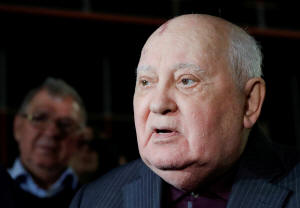|
Gorbachev, leader who pulled Soviets from
Afghanistan, says U.S. campaign was doomed from start
 Send a link to a friend
Send a link to a friend
[August 17, 2021]
MOSCOW
(Reuters) - Mikhail Gorbachev, the leader who oversaw the withdrawal of
Soviet forces from Afghanistan in 1989 after Moscow's failed decade-long
campaign there, said on Tuesday that NATO's own deployment to the
country had been doomed from the start. |

Former Soviet President Mikhail Gorbachev addresses the audience after
the Russian premiere of the documentary film "Meeting Gorbachev" in
Moscow, Russia November 8, 2018. REUTERS/Tatyana Makeyeva/File Photo |
|
Gorbachev, 90, regarded the Soviet presence in Afghanistan as a
political mistake that was sapping precious resources at a time
when the Soviet Union was living through what turned out to be
the twilight of its own existence.
The Soviet-backed authorities in Afghanistan survived for three
years after the withdrawal by Moscow of its main forces but
never recovered from a Russian decision to cut aid to them after
the Soviet collapse in January 1992 and fell later that year.
Gorbachev was cited by Russia's RIA news agency as saying that
NATO and the Americans had no chance of success and had badly
mishandled their own Afghan campaign.
"They (NATO and the United States) should have admitted failure
earlier. The important thing now is to draw the lessons from
what happened and make sure that similar mistakes are not
repeated," Gorbachev told RIA.
"It (the U.S. campaign) was a failed enterprise from the start
even though Russia supported it during the first stages," he
added.
"Like many other similar projects at its heart lay the
exaggeration of a threat and poorly defined geopolitical ideas.
To that were added unrealistic attempts to democratise a society
made up of many tribes."
(Reporting by Andrew Osborn; Editing by Tom Balmforth)
[© 2021 Thomson Reuters. All rights
reserved.] Copyright 2021 Reuters. All rights reserved. This material may not be published,
broadcast, rewritten or redistributed.
Thompson Reuters is solely responsible for this content.

|
|
|




